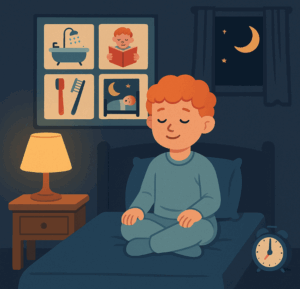🌙 Autism and Sleep: Practical Strategies to Help Your Child Sleep Better
 Sleep is essential for every child’s growth—but for children with Autism Spectrum Disorder (ASD), getting a good night’s rest can be especially difficult. Studies show that up to 80% of children with autism struggle with sleep in some form.
Sleep is essential for every child’s growth—but for children with Autism Spectrum Disorder (ASD), getting a good night’s rest can be especially difficult. Studies show that up to 80% of children with autism struggle with sleep in some form.
These sleep difficulties can worsen behavior, mood, learning, and family stress. Fortunately, there are targeted strategies that work.
🧠 Why Do Children with Autism Struggle with Sleep?
Several overlapping factors can contribute:
-
Sensory sensitivities (e.g., to light, noise, textures)
-
Difficulty with transitions or routines
-
Anxiety or hyperarousal
-
Melatonin dysregulation (the sleep hormone)
-
Co-occurring conditions like ADHD, GI problems, or seizures
Understanding why a child isn’t sleeping is the first step to helping them.
🚩 Common Sleep Problems in Autism
-
Trouble falling asleep (taking more than 30–60 mins)
-
Frequent night wakings
-
Early morning waking
-
Nightmares or night terrors
-
Daytime fatigue or hyperactivity due to poor sleep
🛌 How to Manage Sleep Problems in Children with Autism
1. 🕯️ Set a Predictable Bedtime Routine
Children with autism often thrive on structure.
-
Use a visual schedule to outline steps (e.g., bath → pajamas → brush teeth → story → lights off)
-
Keep it calm, quiet, and consistent—same time, same order
-
Avoid screen exposure at least 1–2 hours before bedtime
Tip: End the routine with a soothing sensory activity (e.g., deep pressure massage, soft music)
2. 🌙 Optimize the Sleep Environment
Make the room sensory-friendly:
-
Use blackout curtains and reduce noise (white noise machines may help)
-
Choose non-irritating bedding—some children prefer weighted blankets
-
Keep room temperature comfortable
-
Remove distractions (toys, bright lights)
3. 🕰️ Use Visual Supports and Timers
Visual timers or countdown clocks can prepare the child for “sleep time.” Try:
-
Visual timers that change color as bedtime approaches
-
Social stories explaining why sleep is important
-
Stickers or reward charts for staying in bed
4. 💊 Consider Melatonin Supplements (With Medical Advice)
Melatonin, a hormone that regulates sleep, is often lower or delayed in autistic children.
-
Low-dose melatonin (1–3 mg) may help with sleep onset
-
Should be prescribed by a doctor—start low, and monitor response
-
Works best with behavioral routines, not as a substitute
Important: Do not self-prescribe or use adult formulations.
5. 🧘♀️ Address Underlying Stress or Anxiety
Many children with autism have difficulty expressing worry.
-
Use bedtime journals, drawings, or feelings charts
-
Relaxation strategies: deep breathing, progressive muscle relaxation
-
If persistent, consult a child psychiatrist or psychologist
6. 🧩 Treat Co-existing Medical Conditions
Check for:
-
Reflux or constipation disrupting sleep
-
Epilepsy (if night wakings are unusual or jerky)
-
ADHD or anxiety, which can worsen bedtime resistance
Treating these conditions often improves sleep indirectly.
📋 When to Seek Professional Help
Consult a pediatric sleep specialist or child psychiatrist if:
-
Sleep issues persist beyond 6 weeks despite home strategies
-
Daytime functioning is affected (irritability, attention, aggression)
-
There’s risk of self-injury, elopement, or family burnout
✅ A Parent’s Checklist
✅ Regular bedtime
✅ No screens 2 hours before bed
✅ Visual schedule for sleep routine
✅ Sensory-appropriate room
✅ Limited evening caffeine/sugar
✅ Melatonin only if prescribed
✅ Reward good sleep habits
✅ Seek help early if overwhelmed
💬 Final Thought
Helping an autistic child sleep better is not a one-size-fits-all process—it’s about understanding their unique needs, building routines, reducing anxiety, and sometimes using medication thoughtfully. With time and support, most children show marked improvement in sleep quality.
Dr. Srinivas Rajkumar T, MBBS, MD (Psychiatry)
Consultant Psychiatrist
Apollo Clinics Velachery & Tambaram
🧩 Child & Adolescent Mental Health Specialist | Autism & Sleep Disorders Expert
🌐 www.srinivasaiims.com
📞 Online & In-Person Consultations Available